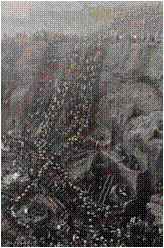

Brazil's Age of Gold
nBetween 1580 and 1640 Portugal and Brazil shared the same monarch, the Habsburg ruler of Spain.
nDuring the 17th century struggles between Spain and Holland, the Dutch occupied part of Brazil until expelled in 1654.
nMeanwhile the Dutch, English, and French had established sugar plantation colonies in the Caribbean.
nThe resulting competition lowered sugar prices and raised the cost of slaves.
nBrazil lost its position as predominant sugar producer, but exploring backwoodsmen (Paulistas) discovered
gold in the Minas Gerais region in 1695.
nPeople rushed to the mines and formed new settlements.
nBrazil then was the greatest source of gold in the Western world.
nThe gold, and later diamond discoveries, opened the interior to settlement, devastated Indian populations, and weakened coastal agriculture.
nRio de Janeiro, nearer to the mines, became a major port and the capital in 1763.
